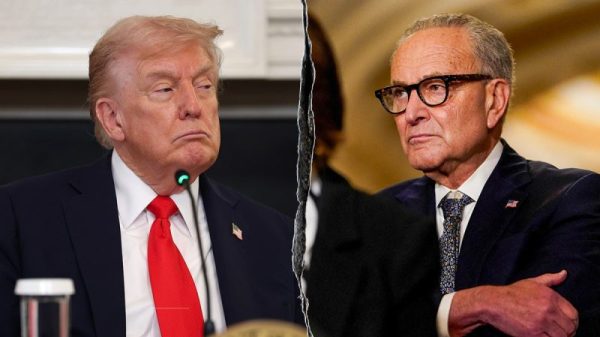Rep. Garret Graves (R-La.) announced Friday that he will not seek another term after a court-ordered redistricting made his path to reelection harder and raised the possibility that he could run against a fellow Louisiana GOP lawmaker.
“After much input from constituents, consultation with supporters, consensus from family, and guidance from the Almighty, it is clear that running for Congress this year does not make sense,” Graves said in a statement. “It is evident that a run in any temporary district will cause actual permanent damage to Louisiana’s great representation in Congress.”
Graves’s decision comes about a month after the Supreme Court ordered Louisiana to use a map that redrew the 6th Congressional District, in which he serves, into the state’s second Black-majority district. That left Graves, who is White, either facing an uphill battle in his district or potentially running against Rep. Julia Letlow, a fellow Republican, in the neighboring 5th Congressional District.
First elected in 2014, Graves was a close ally of former House speaker Kevin McCarthy (R-Calif.) before his ouster last year. Graves played a lead role in negotiating the May 2023 deal to avoid a default on U.S. debt.
He also authored the centerpiece of a legislative package last year that sought to bring down energy costs.
Graves initially reacted to the Supreme Court ruling by promising to run for reelection in an unspecified “district anchored in the Capital Region,” referring to the Baton Rouge area. But House Speaker Mike Johnson (R-La.) launched an effort to stave off a member-on-member primary, endorsing all his Louisiana GOP colleagues, including Graves, for reelection in their existing districts.
While the map endangered Graves, it protected the rest of the Louisiana GOP delegation, including its two most powerful members — Johnson, the speaker, and Rep. Steve Scalise, the House majority leader.
On Friday, Graves predicted that the districts would be shaken up again after the 2024 elections. He also lamented Louisiana’s loss of influence on the House Transportation and Infrastructure Committee, of which he is a member.
“Admittedly, it is a serious disappointment to miss the historic opportunity to champion Louisiana’s priorities in this committee,” he said.
The map that dismantles Graves’s district has the backing of Louisiana Gov. Jeff Landry, an intraparty rival of the congressman. Last year, Graves supported one of Landry’s GOP opponents in the gubernatorial race.
Graves’s decision leaves two Democrats running for the 6th District: state Sen. Cleo Fields and social justice activist Quentin Anthony Anderson. The candidate filing deadline is July 19.
In Louisiana, congressional candidates from all parties run on the same ballot in the November election; if no one gets a majority, the top two vote-getters advance to a December runoff.
Rep. Garret Graves (R-La.) announced Friday that he will not seek another term after a court-ordered redistricting made his path to reelection harder and raised the possibility that he could run against a fellow Louisiana GOP lawmaker.
“After much input from constituents, consultation with supporters, consensus from family, and guidance from the Almighty, it is clear that running for Congress this year does not make sense,” Graves said in a statement. “It is evident that a run in any temporary district will cause actual permanent damage to Louisiana’s great representation in Congress.”
Graves’s decision comes about a month after the Supreme Court ordered Louisiana to use a map that redrew the 6th Congressional District, in which he serves, into the state’s second Black-majority district. That left Graves, who is White, either facing an uphill battle in his district or potentially running against Rep. Julia Letlow, a fellow Republican, in the neighboring 5th Congressional District.
First elected in 2014, Graves was a close ally of former House speaker Kevin McCarthy (R-Calif.) before his ouster last year. Graves played a lead role in negotiating the May 2023 deal to avoid a default on U.S. debt.
He also authored the centerpiece of a legislative package last year that sought to bring down energy costs.
Graves initially reacted to the Supreme Court ruling by promising to run for reelection in an unspecified “district anchored in the Capital Region,” referring to the Baton Rouge area. But House Speaker Mike Johnson (R-La.) launched an effort to stave off a member-on-member primary, endorsing all his Louisiana GOP colleagues, including Graves, for reelection in their existing districts.
While the map endangered Graves, it protected the rest of the Louisiana GOP delegation, including its two most powerful members — Johnson, the speaker, and Rep. Steve Scalise, the House majority leader.
On Friday, Graves predicted that the districts would be shaken up again after the 2024 elections. He also lamented Louisiana’s loss of influence on the House Transportation and Infrastructure Committee, of which he is a member.
“Admittedly, it is a serious disappointment to miss the historic opportunity to champion Louisiana’s priorities in this committee,” he said.
The map that dismantles Graves’s district has the backing of Louisiana Gov. Jeff Landry, an intraparty rival of the congressman. Last year, Graves supported one of Landry’s GOP opponents in the gubernatorial race.
Graves’s decision leaves two Democrats running for the 6th District: state Sen. Cleo Fields and social justice activist Quentin Anthony Anderson. The candidate filing deadline is July 19.
In Louisiana, congressional candidates from all parties run on the same ballot in the November election; if no one gets a majority, the top two vote-getters advance to a December runoff.





















